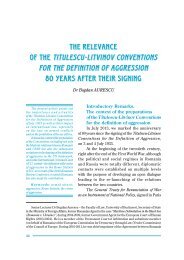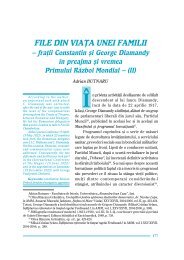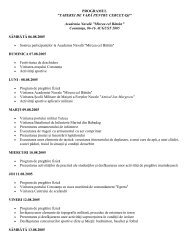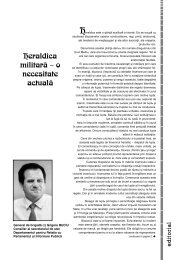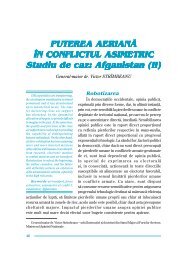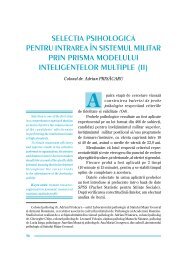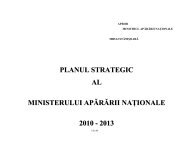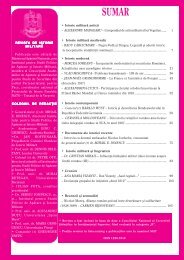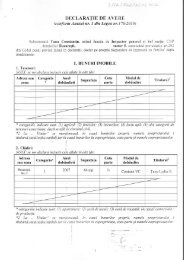You also want an ePaper? Increase the reach of your titles
YUMPU automatically turns print PDFs into web optimized ePapers that Google loves.
in the protection of the environment, which in a<br />
compulsory EU requirement.<br />
Regarding the energy corridors, Bucharest<br />
strongly supports Nabucco gas pipeline, a big EU<br />
project, which is said by many analysts to be the<br />
geo-economic “rival” of the Blue Stream II and<br />
South Stream (the Russian parallel projects), not<br />
because it is seeing the building of energy corridors<br />
like a zero-sum game between Russia and the EU<br />
states, but because this pipeline coming from<br />
Azerbaijan and Turkey to Austria would ensure the<br />
beginning of a real energy independence for the<br />
EU states towards Russia. 7 EU imports too much<br />
of its natural gas from a single country, Russia, or<br />
from sources that are under Russian control – more<br />
than 30% from the total imports and it’s foreseen<br />
to have about 65-80% in 2020. Thus, EU needs to<br />
diversify its suppliers. 8 Unfortunately, up to now,<br />
BSEC does not have a real decision-making power<br />
concerning the transit corridors and the interstates<br />
negotiations are usually bilateral not<br />
multilateral. It would be very useful to have a wide<br />
and deep cooperative framework among EU, BSEC<br />
and Russia in the realm of energy sharing and<br />
transportation, but a prior condition would be the<br />
signing and ratification of the European Energy<br />
Charter by Russia and all the other interested states<br />
and common rules for the access on energy<br />
infrastructures markets.<br />
In order to have good assessment of the<br />
security situation in the Black Sea region, one<br />
needs a conundrum of academic and practical<br />
experience. Consequently, Greece’s efforts to link<br />
the academics and policy-makers in the Black Sea<br />
area were crowned by the setting up of the<br />
International Center for Black Sea Studies (ICBSS),<br />
headquartered in Athens, a project warmly<br />
supported by Romania. In 2008, the International<br />
Centre for Black Sea Studies (ICBSS) is celebrating<br />
its tenth year of existence and is may be the main<br />
academic think tank dedicated to the study of<br />
security, politics and economy in the region, thus<br />
serving as a very important expertise provider for<br />
governments and for the BSEC executive structures.<br />
The Black Sea Trade and Development Bank,<br />
which is the organization’s main funding mechanism,<br />
is based in Thessaloniki and has an<br />
important role in promoting financial stability and<br />
investments in this region. Concerning Romania,<br />
“the BSTDB will focus in the next four years on<br />
����� Review of Military History �����<br />
providing financial support to large and medium<br />
sized companies engaged in particular in export<br />
generating activities, infrastructure and financial<br />
sector” (Romania – Country Strategy 2007-2010). 9<br />
Greece has a strategy which insists on the benefits<br />
of regional cooperation for promoting investments<br />
and trade in neighboring states – “instead, for<br />
operations undertaken in Greece, the Bank needs<br />
to focus most on fulfillment of the regional<br />
cooperation aspect of its mandate. Promoting<br />
regional cooperation is important for Greece,<br />
which borders on countries with which investment<br />
and commercial ties had remained at very low<br />
levels for decades. As a result, much remains to be<br />
done to interconnect with neighboring countries<br />
in order to improve relative efficiencies, realize<br />
economies of scale, and achieve better complementarity.<br />
(Greece – Country Strategy 2007-2010,<br />
Thessaloniki, December 2006 10 ) In June 2008, at<br />
the 10th Annual Meeting in St. Petersburg of the<br />
Board of Governors, the Black Sea Bank posted<br />
some impressive results for 2007 financial year,<br />
“with 60% growth of outstanding portfolio and 15%<br />
increase in operating income. The amount of<br />
approved operations exceeded USD 1,3 billion”. 11<br />
Romania was also deeply involved in the drafting<br />
and adoption of the BSEC Economic Agenda for<br />
the Future.<br />
On 1 May 2006, for the first time, a Greek<br />
representative, Ambassador, L. Chrysanthopoulos,<br />
assumed the post of Secretary General of the<br />
BSEC Permanent International Secretariat; he was<br />
elected, through consensus, by the Council of<br />
Ministers of Foreign Affairs of the BSEC member<br />
states.<br />
Greece had the chairmanship previously in<br />
May-October 1999 and Athens took the necessary<br />
actions to ensure the BSEC observer status at the<br />
UN General Assembly. The initiative to strengthen<br />
relations between the BSEC and the UN was<br />
adopted in 2000 by the UN General Assembly. In<br />
November 2006, the BSEC signed an agreement<br />
with the United Nations Development Programme,<br />
for the joint implementation of the Black Sea Trade<br />
and Investment Promotion Programme. This<br />
pioneering programme is funded jointly by Greece<br />
and Turkey, with a symbolic financial contribution<br />
from the BSEC. The BSEC completed negotiations<br />
with the OECD Development Center on implementing<br />
a programme entitled “Black Sea and<br />
75



